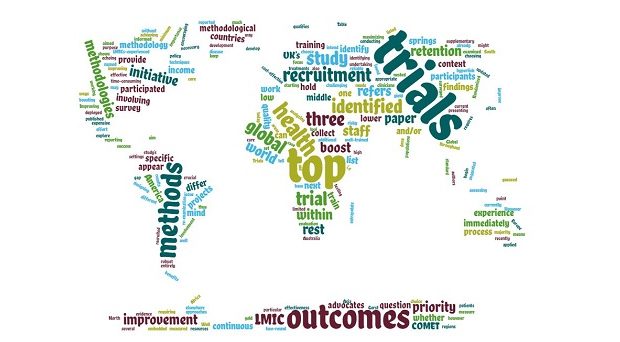
Randomized clinical trials, the ‘gold standard’ tool for assessing the effectiveness of treatments, are a challenging, time-consuming and expensive undertaking.
To develop trials that yield robust and reliable results, thus maximizing the benefits of the research, much care ought to be applied throughout the process, in designing, conducting, analyzing and reporting the outcomes of the trial; this requires a continuous process improvement policy, in which research methodologies are examined and updated where necessary.
The continuous improvement needs to be informed by specific research projects (methodological projects) that focus on testing different approaches to improve trials.
In the context of global health clinical trials, the question that immediately springs to mind is whether the priorities in the UK hold for the rest of the world.
A survey for the purpose of identifying trials research methodology priorities in the UK, i.e. research methodologies requiring re-examination and/or improvement, has named the top three UK priorities as: “How to boost recruitment”, “How to keep participants in the trial once they have been recruited”, and “How to choose which outcomes to collect”.
Global health clinical trial priorities
In the context of global health clinical trials, the question that immediately springs to mind is whether the priorities in the UK hold for the rest of the world, in particular for low to middle income countries (LMICs). Well, you might have guessed it – not entirely.
The current study, a two-round survey involving researchers with experience in trials in LMICs, aimed to identify top priorities for methodology research in these regions.
The majority of researchers who participated reported to be currently working in Africa; however researchers in Asia, Europe, South America, North America and Australia also participated.
The study shows that the top priority (echoing one of the UK study’s top priorities) refers to the choice of appropriate outcomes to measure. There has been already work done on this issue through the COMET initiative, which advocates for the development of a minimum set of core outcomes for specific disease areas and/or populations.
The next top research priority identified in LMICs refers to methods to train research staff, while the UK’s other top three priorities, methods to boost recruitment and retention, appear lower down on the LMIC list.
However, it would be risky to extrapolate the findings of this initiative to LMICs without involving LMICs-experienced researchers: it may well be the case that outcomes of importance to patients and clinicians in LMICs differ from those elsewhere or that the way in which outcomes are measured differ. This is why COMET advocates the involvement of LMICs researchers within the initiative, a gap recently identified (see supplementary Table 6 in paper by Gorst et al.).
The next top research priority identified in LMICs refers to methods to train research staff, while the UK’s other top three priorities, methods to boost recruitment and retention, appear lower down on the LMIC list; the additional top LMIC priorities can be found listed within the paper.
Having well-trained staff is crucial for the success of a trial, but in settings where resources are often limited what are the most cost-effective ways of achieving high quality training? What methods and techniques can be deployed, and how? It is suggested that several training methods could be embedded within trials; a nested evaluation study could provide means to identify which one qualifies as the most effective.
By presenting the findings of our study here we intend to provide a starting point for encouraging further methodological research work in clinical trials in LMICs, with the aim of improving the quality of the global health clinical research evidence base.
Comments